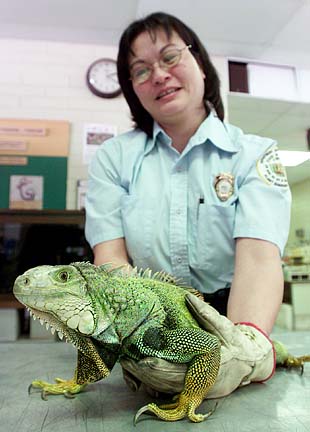


|
2002 is starting off a bit rough for Iggy, a fat, green iguana. Illegal iguana
caught in KahukuIt is caught red-hibiscus-handed
on New Year's EveBy Pat Omandam
pomandam@starbulletin.comIn Kahuku, the 3-foot-long male iguana could not avoid capture on New Year's Eve at the Turtle Bay Golf Course.
A golf course worker grabbed the iguana barehanded after she spotted it near some red hibiscus plants, one of its favorite foods. During the pursuit, the reptile lost a 2-foot portion of its 4-foot-long tail, which is its natural defense against predators, state agriculture officials said.
"When they tried to capture it, it (the tail) broke off," said Lisa Nakayama, land vertebrate animal specialist for the state Department of Agriculture.
Still, the iguana should consider itself lucky to live in Hawaii. In its native Central America, green iguanas are traditionally used as a source of food by Latin American farmers, who refer to the reptile as "chicken of the tree" because it tastes like chicken.
Any iguanas brought to the state plant quarantine station are affectionately nicknamed "Iggy," Nakayama said.
While it is illegal to possess or transport iguanas here, that has not stopped this coldblooded animal from establishing itself in Waimanalo, where wild nests with eggs have been found. Less than half a dozen iguanas were captured or turned in to the state in 2001.
Reports of iguanas in Kahuku are rare, and Nakayama does not believe it crawled there from Waimanalo. Instead, it probably came from somewhere on the North Shore. There was a report of a iguana at the golf course last April, she said.
When fully grown, iguanas may reach up to 6 feet in length from head to tail. Iguanas are typically vegetarians but are known to disturb bird nests and feed on eggs. Since they are tree climbers, they pose a threat to the state's fruit industry, especially papayas and bananas.
"If they were to really establish themselves here ... it wouldn't be a problem for them to find food," she said.
Nakayama said this iguana seemed to be well fed, actually fat. She said its tail will grow back.
The iguana will be kept at the quarantine station until next week, when it will be moved to the Honolulu Zoo until it can be shipped out of state.
State officials warn that people who possess illegal animals face penalties, including fines of up to $200,000 and up to three years in jail. Individuals with illegal pets are encouraged to turn them in under the department's amnesty program.
Anyone with information or knowledge of illegal animals in Hawaii is asked to call the department's pest hot line at 586-7378 (586-PEST).